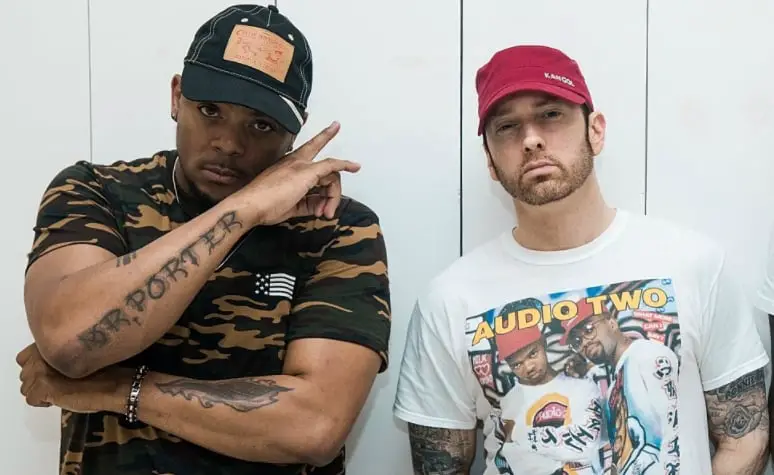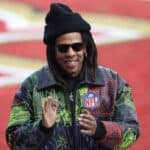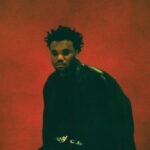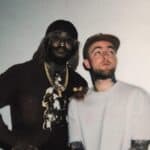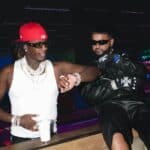Denaun talks about working with Eminem, Dr. Dre, Royce, and more.
The longtime Eminem friend and producer Denaun Porter caught up with HotNewHipHop for a new in-depth interview, where he talks about working in the pandemic, creating beats for 50 Cent, Busta Rhymes, Lil Kim, Method Man, The Game, Emine, Hopsin, and more. He also talks about starting working with a Young Eminem and creating his first album “Infinite“.
It didn’t take long for him to get traction behind the boards, and he’s still a force to be reckoned with. Denaun has produced beats for artists like 50 Cent, Xzibit, G-Unit, Busta Rhymes, Lil Kim, Method Man, Royce Da 5’9”, The Game, Eminem, Grafh, Hopsin, and others. While doing so, he proceeded to build on his foundation, creating a sound that would come to embody his vision of Detroit. Denaun has earned the right to speak as an authority after more than two decades in the game, having logged over ten thousand hours.
We met with Denaun Porter for a lengthy chat about life and the legacy he has established for himself in the face of a world-changing epidemic that has brought uncertainty to virtually every routine. This is a must-read for anybody interested in Denaun’s musical career, which includes his time in D12, working with Eminem and Dr. Dre, and interacting with some of hip-hop’s finest lyricists.
Check out some of the interview conversations below.
HNHH: Denaun, what’s up! How’s it going these days? How’s the quarantine going?
Denaun: It’s good. I mean I’ve been good mentally. I think that’s the challenge. I’m a hypochondriac first, so having anxiety and all that, it’s been teaching me how to be more mindful of that but I’m good, how about you?
HNHH: You know, kind of the same boat. Pretty much been in the house for like forty days at this point. I’m still lucky enough to be working so I get to have some normalcy. Are you making a lot of beats, working on music at all?
Denaun: Yeah, I’m always making- you know what’s really weird? I moved from just making beats a while ago. I think you always are a person who makes beats, but I try not to touch nothing unless I’m producing something. Even with it not being for an artist, I’m finding myself- if it’s not something I’m using for my own album, I’ll produce the whole idea out. So it’s been like, just producing, producing, producing man like, consistently you know?
I haven’t been able to nail a lot of vocals yet because some days when I think about what I want to write about and whatever the content of the song is, I’ll get the whole song. I got the whole album like right now, I sent it to Royce two days ago and was like “Yo I got the album, I just don’t have all the songs because every time I think about it, something will come out on the news. I’ll find out somebody that I know passed away.” It’s just throwing me off, you know what I mean?
It’s just super weird. I’m now trying to battle that and get back in it. But I’ve been doing a lot of producing, playing Oculus [laughs].
HNHH: Have you been keeping in touch with some of your circle too? Artists like Em or Royce — have you guys talking about creating during this period at all?
Denaun: We talk everyday pretty much. Em and Royce, that’s like mainstay, we talk anytime, we’re always talking. Me and Royce kind of work on the same schedule. It’s like we sleep when we sleep, eat when we eat, work when work, but I got a workout schedule that I keep right now. Marshall, it’s kind of of like the same thing. We still creating during this time, if we can.. We all have setups to do that, but I don’t know what’s gonna happen, you know what I mean, like whatever comes of it, I don’t know.
I wouldn’t say anyway if we had something in the chamber [laughs]. But we all are creating, but we’re constantly talking about what’s happening, and dealing with it. Donating, making sure people have things. I think it’s very important to- I think just more for me it’s a personal thing, so everybody in my life that I know, if you’re somebody that needs groceries, or somebody that needs help with rent, just little things that I could do. It’s a lot of prayer, a lot of just being a therapist to people, but we talk everyday. Sometimes you gotta talk each other off ledges, you know?
HNHH: The game has really changed so much. For me, my golden era was like, 98-2003. That’s my hip-hop era, my favorite time. I always compare then and now, the musical trends and the way things were working, and I keep looking back to “Devil’s Night.” The singles off that album were so dark, and it’s shocking but awesome that those particular songs — “Purple Pills” and “Fight Music” — managed to move so many units. You’ll never hear a single like those today. Those are dark, badass tracks. Can you walk me through the process of deciding on your lead singles?
Denaun: At that time, I remember doing the album and working on “Ain’t Nothin’ But Music” with Dre, and “Fight Music” came out of that session there, in L.A. I remember trying to figure out what to do. I don’t remember if we had “Purple Pills” already, that might have come early in the game. But “Fight Music” was a no brainer. Em always said — he still says — that that’s his best vocal performance ever, in his whole career. From the verse to the hook, he felt like that was his best. And I would say that’s one of my best, and one of my favorites.
But “Purple Pills,” it felt more like what we were. We were raging young twenty-year olds man. We was on that, it was a college party every night. That’s a big difference from where we come from, Detroit. Detroit wasn’t playing our music because it didn’t fit. We had our own thing going on, and if we cared about them not playing the music—it hurt, but that song, I remember thinking to myself “they not going to play this song.” We didn’t get a lot of respect with the other artists right away because of that song. I hated performing it after a while, but everyone hate performing their biggest records.
For what we were looking for, “Ain’t Nothin But Music,” “Fight Music,” and “Purple Pills” were the right songs. Everything Dre was coming with at that time would just work. I knew when I heard “Fight Music” and “Revelation,” those two had the same kind of feel. I think it worked because people had never heard that before. It reminds you of the old rock bands, right? You could see Pink Floyd or somebody doing something crazy like that. Having a song that was really dark, it wasn’t this big shiny suit kinda thing. It worked cause of the approach.
HNHH: On that dark note, I always liked “American Psycho.”
Denaun: Aw yeah.
HNHH: That’s probably one of my favorite of your verses. Maybe Em verses too. Bizarre, obviously [laughs]–
Deanun: He comes out of nowhere with it. That album, man, when I think about it, there wasn’t a lot of skippers on that album. It was really well put together.
HNHH: I know that one of the first albums you produced on, and helped put together was Eminem’s Infinite. When you were first presented with the idea of piecing together an album for an artist, was that something that excited you at the time? Was there a specific quality you wanted to bring out of young Em?
Deanun: First off, I was only doing beats three-four months at that time. I was a novice producer. I didn’t know I was good. I had a crew I was with, and I was taking it so seriously I was spending every dime I had to go to the studio. When I met with Em, it was somebody with the same work ethic. He’d be excited about the beats. Once we had the first record — on Infinite the first song we did was “Backstabber.” [Laughs] That’s the first beat I gave him, the first song for that project.
Then he started going into what was happening. At that time, it was Nas, AZ, and LL. We were just trying to get radio play. To get noticed by the radio when we was kids. While we were trying to do that, I’d just use everything I had. Soul samples — I wanted people to feel something. All the songs meant something to us, it was really important that we did them. We started off making albums. That’s me and Em’s relationship. So anytime he was working on an album, that was the thing. I started off producing, I didn’t start off making beats. When we got to the studio, Em was like ‘I think this is dope but I want to change the drums.’ Proof had an SP-1200. I didn’t have that kind of stuff. What I made that album on was an Akai SO1, which didn’t even have a sequencer. I did all of that stuff by hand. [Laughs]
Then Proof came in and fixed the drums on two or three songs, and that kind of birthed producing. Cause I was like, why didn’t those drums work? So the next time we worked on something was the Slim Shady EP, and I was all the way good to go. I learned something from Infinite and moved straight to the Slim Shady EP, and then moved into the Slim Shady LP. So I got thrown into it as a producer and I learned very fast. When Em would come home and play songs, I had an advantage because I could hear the songs he was working on with Dre. So I already knew what to do to step my game up. I was moving through super fast, man.
On Infinite, I knew I wanted it to sound soulful. I wanted people to hear him over some sh*t like that. I knew he could rap. The first thing I told him was “Em, you gotta slow down.” He rapped so fast, I was like man could you say this slower? And that started it.
HNHH: When you were coming up and working on this stuff, can you paint a picture of the Detroit hip-hop landscape at the time? How was hip-hop music manifesting in Detroit?
Denaun: It was like Redman, 2Pac. I think 2Pac All Eyez On Me came out. There was a variety of music going on. De La Soul’s Stakes Is High. We were really into 2Pac right, but we couldn’t make 2Pac records, cause that would sound like Em trying to be like Pac. Even though he’s super influenced by it. I think Detroit had our own–bass lines was our thing. Production-wise, the bass lines and the drums had to be poppin’. At the time Jay Dee, I was able to learn from him, before I got to learn from Dre. Poppin’ drums and off-beat/on-beat kinda thing. If you listen to “Just Don’t Give A F**k,” there’s no sequence to that song. It’s all live. I had to play it like that, cause I had a keyboard called an EMAX, and it also didn’t have a sequencer. I was figuring it out with what I had. When I gave him those beats, it was this filthy, dirty-a** sound, and I was like this is our sound. It’s gotta be filthy. Everything I had produced for D12 back then, for Em back then after Infinite. Infinite was cool, it had some great moments. J. Cole told me he loved the beat from “Infinite” and it f**ked me up. I was like, how did you even know about that song! He said it was one of his favorite joints. I was flattered by that, and I was around his age when he told me that. [Laughs] J. Cole told me he loved the beat from “Infinite” and it f**ked me up. I was like, how did you even know about that song! For me, it was just dirt. Dirt, dirt, dirt, dirt. There was already a Dilla sound, and I didn’t want to sound like Jay Dee. I listened to a lot of RZA, and I listened to a lot of Erick Sermon. I took both of those influences and created what D12’s sound was, and Em at that time. I just called it filth. The samples was cruddy as f**k, 8-bit sounding. But everything around us, OutKast was poppin’, 2Pac was poppin’. De La Soul. Nas’ It Was Written was out. Fugees. During Infinite we were trying to do what people was doing — we were still trying to get that play. But after that, that’s when it really formed. D12’s sound, Devil’s Night, was just a little bit cleaner version of the filth. You get what I’m saying?
Definitely. Between you, Em, and Dre, that’s a three-headed monster on the beats. I can only imagine some of those sessions must have been insane.
Man, yeah! I would come in and play some s**t. I got so many songs with Dre and Snoop that we did back then that Dre had. I played a skit, but it was a beat. I chopped up “Love and Happiness.” It’s a song that Dre has tucked away, and he and Snoop were killing that s**t. And it was a skit, but Dre was like “what the f**k is that!?” We would all hear beats from each other, it was fun. Really fun.
Check out the full interview here on HotNewHipHop.

